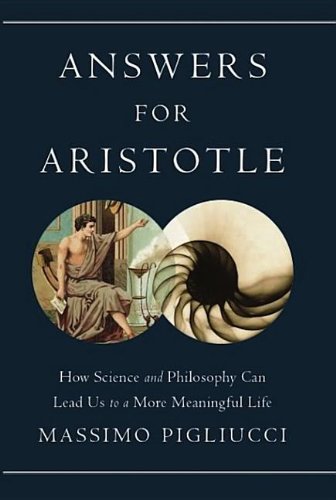
Answers for Aristotle
How Science and Philosophy Can Lead Us to A More Meaningful Life
کتاب های مرتبط
- اطلاعات
- نقد و بررسی
- دیدگاه کاربران
نقد و بررسی

August 20, 2012
In this careful examination of the surprising connections between science and philosophy, CUNY-Lehman College philosopher Pigliucci (Nonsense on Stilts: How to Tell Science from Bunk) begins with "sci-phi," the "idea that philosophy and science can be combined to give us the best possible knowledge about the world and how to act within it." He links Aristotle's observations on the striving for moral and physical happiness against the desire for immediate gratification with recent research on weight loss, demonstrating the physical limits of most treatments. Using the often-discussed "trolley dilemma," in which one person must be sacrificed if the majority are to be saved, the author explains how most people follow a utilitarian approach toward moral decision-makingâpursuing the greatest good for the greatest number of people. They follow a different theory, however, if the situation requires them to actively harm someone in order to save lives. Brain scans of healthy people support these tests, showing that different situations provoke reactions in sections of the brain associated with either emotion or abstract reasoning. This is a witty and insightful look at the relevance of philosophy today. Agent: Judy Heiblum, Sterling Lord Literistic.

September 1, 2012
A look at why both science and philosophy are necessary to "approach the perennial questions concerning how we construct the meaning of our existence." Pigliucci (Philosophy/CUNY-Lehman Coll.; Nonsense on Stilts: How to Tell Science From Bunk, 2010, etc.), who holds doctorates in both biology and philosophy, provides an overview of relevant philosophic arguments about virtue, beginning with Aristotle's thoughts on how to achieve a happy and fruitful life: "doing the right things for the right reason" while rising above "weakness of the will." Pigliucci compares this with the views of utilitarian philosophers such as Jeremy Bentham and the rule-based prescriptions of Immanuel Kant. He also looks at how neuropsychologists deal with the putative existence of free will by constructing experiments (using fMRI scanning devices) that show brain activations of muscles before a subject is aware of making a conscious decision to act. Warning that experiments often do not simulate realistic situations, he argues that the relationship between science and philosophy is highly complex. We must "let philosophy (informed by science) guide us in principle, and to use science (steered by philosophy) as our best bet for implementing those principles," he writes. Pigliucci applies Aristotle's four causes principle to illustrate the nature of religious belief, which "is made possible by the neurobiological characteristics of the human brain that make us prone to superstitious thinking." A useful introduction to sources on both sides of the science-philosophy divide.
COPYRIGHT(2012) Kirkus Reviews, ALL RIGHTS RESERVED.

























دیدگاه کاربران